
ai-self-coding-book
《方糖AI自编程入门》用自然语言和 AI 写出复杂的商业应用。Here’s how.
Stars: 98
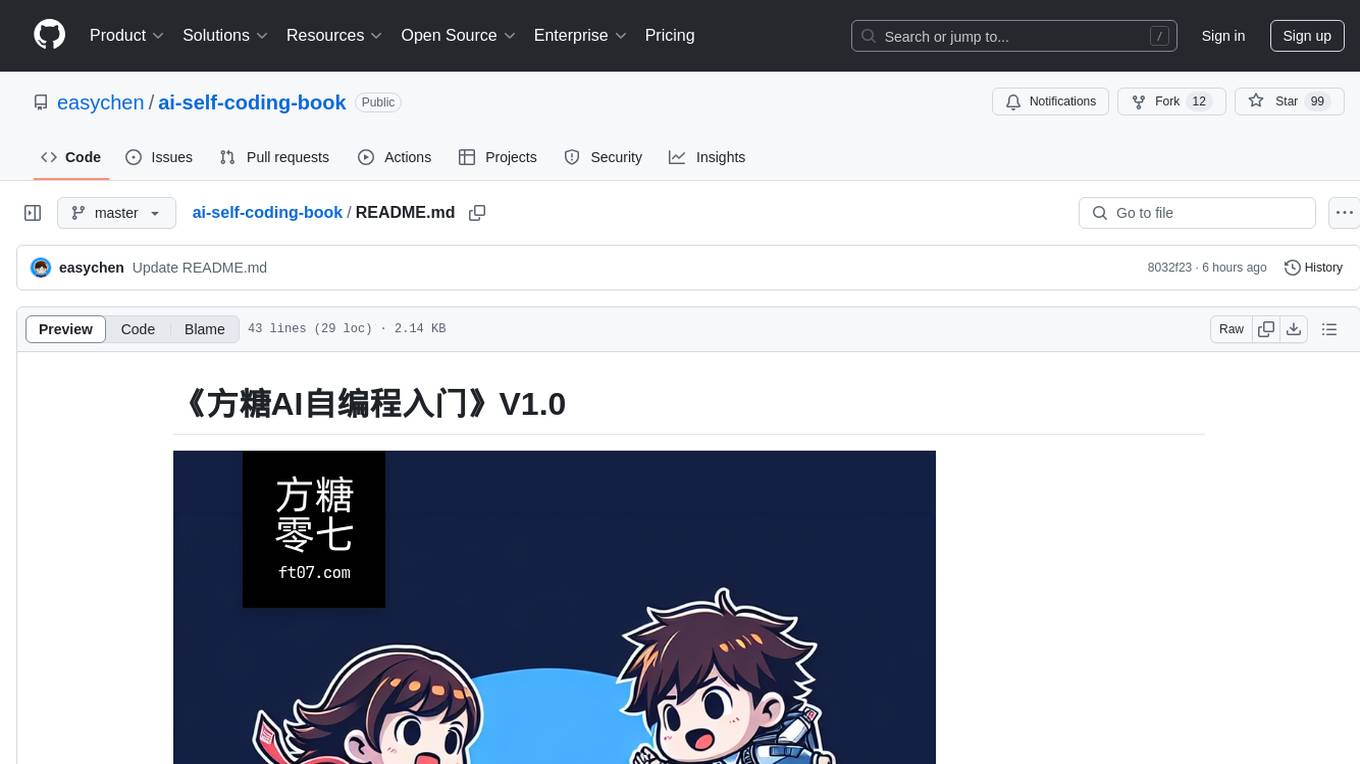
The 'ai-self-coding-book' repository is a guidebook that aims to teach how to create complex applications with commercial value using natural language and AI, rather than simple toy projects. It provides insights on AI programming concepts and practical applications, emphasizing real-world use cases and best practices for development.
README:
这本书尝试分享如何用自然语言和AI写出真正具有商业价值的复杂应用,而不是那些贪吃蛇玩具。可以看看这个证据。
- 作者
本书采用CC-BY-NC-SA协议发布。
- 您可以复制、发行、展览、表演、放映、广播或通过信息网络传播本作品,但必须署名作者并添加链接到本书GitHub仓库。
- 不得为商业目的而使用本作品。
- 仅在遵守与本作品相同的许可条款下,您才能散布由本作品产生的派生作品。
- 可使用 mdbook-epub 工具自行编译:
mdbook-epub --standalone true然后 epub 在 book 目录下 - 在官方网站下载(页面最下方):https://ft07.com/ai-self-coding-quick-start/
(推荐,体验更好,且可以评论)
For Tasks:
Click tags to check more tools for each tasksFor Jobs:
Alternative AI tools for ai-self-coding-book
Similar Open Source Tools

ai-self-coding-book
The 'ai-self-coding-book' repository is a guidebook that aims to teach how to create complex applications with commercial value using natural language and AI, rather than simple toy projects. It provides insights on AI programming concepts and practical applications, emphasizing real-world use cases and best practices for development.
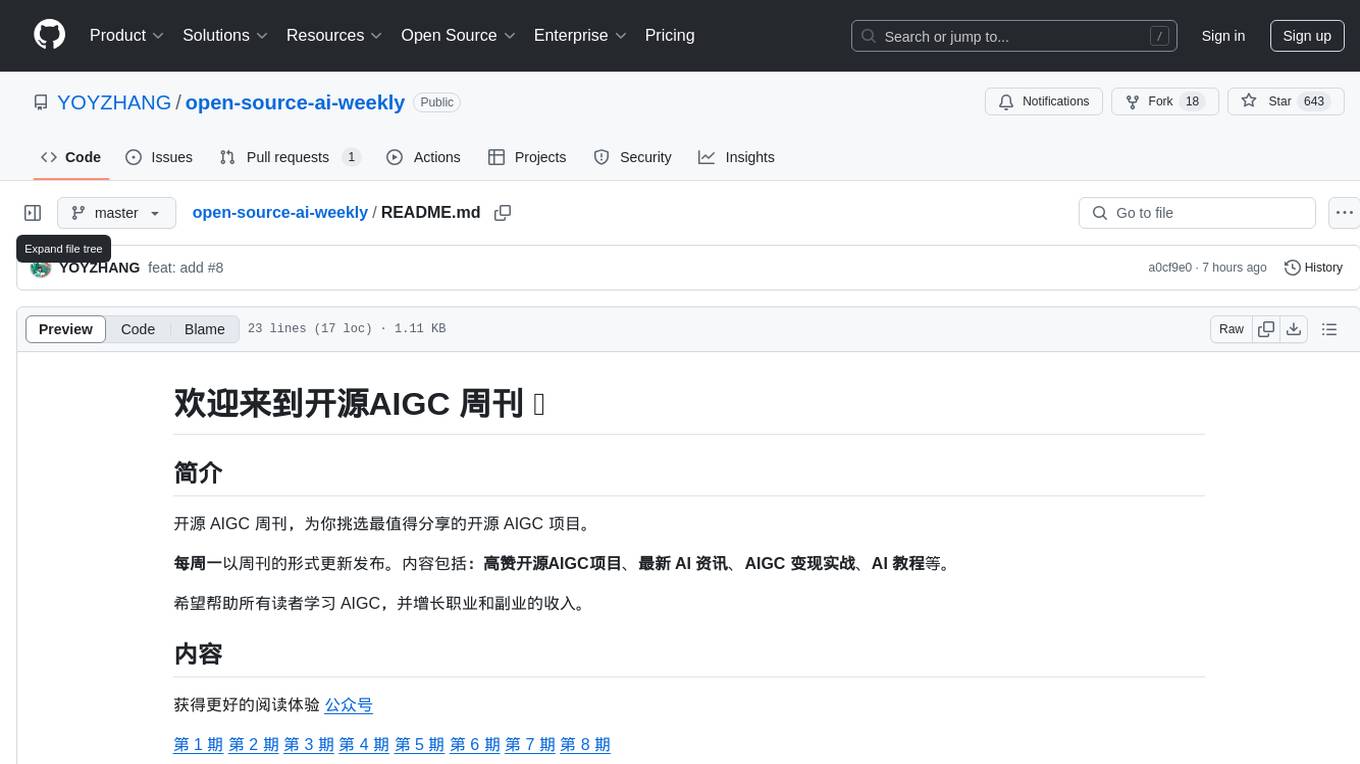
open-source-ai-weekly
Open-source AIGC Weekly is a curated publication that selects the most valuable open-source AIGC projects. It is updated weekly with content including top-rated open-source AIGC projects, latest AI news, AIGC monetization strategies, and AI tutorials. The goal is to help readers learn AIGC, enhance their career, and increase their income through both primary and side ventures.
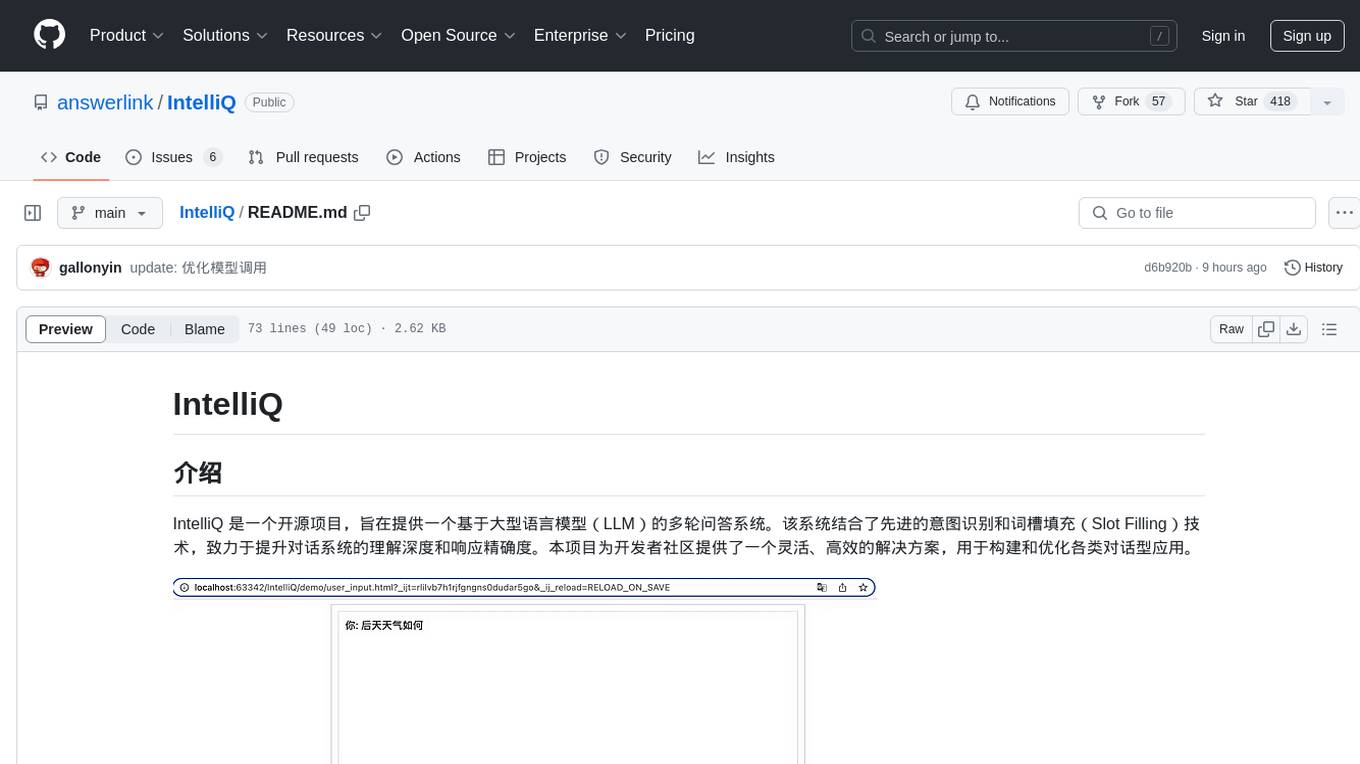
IntelliQ
IntelliQ is an open-source project aimed at providing a multi-turn question-answering system based on a large language model (LLM). The system combines advanced intent recognition and slot filling technology to enhance the depth of understanding and accuracy of responses in conversation systems. It offers a flexible and efficient solution for developers to build and optimize various conversational applications. The system features multi-turn dialogue management, intent recognition, slot filling, interface slot technology for real-time data retrieval and processing, adaptive learning for improving response accuracy and speed, and easy integration with detailed API documentation supporting multiple programming languages and platforms.
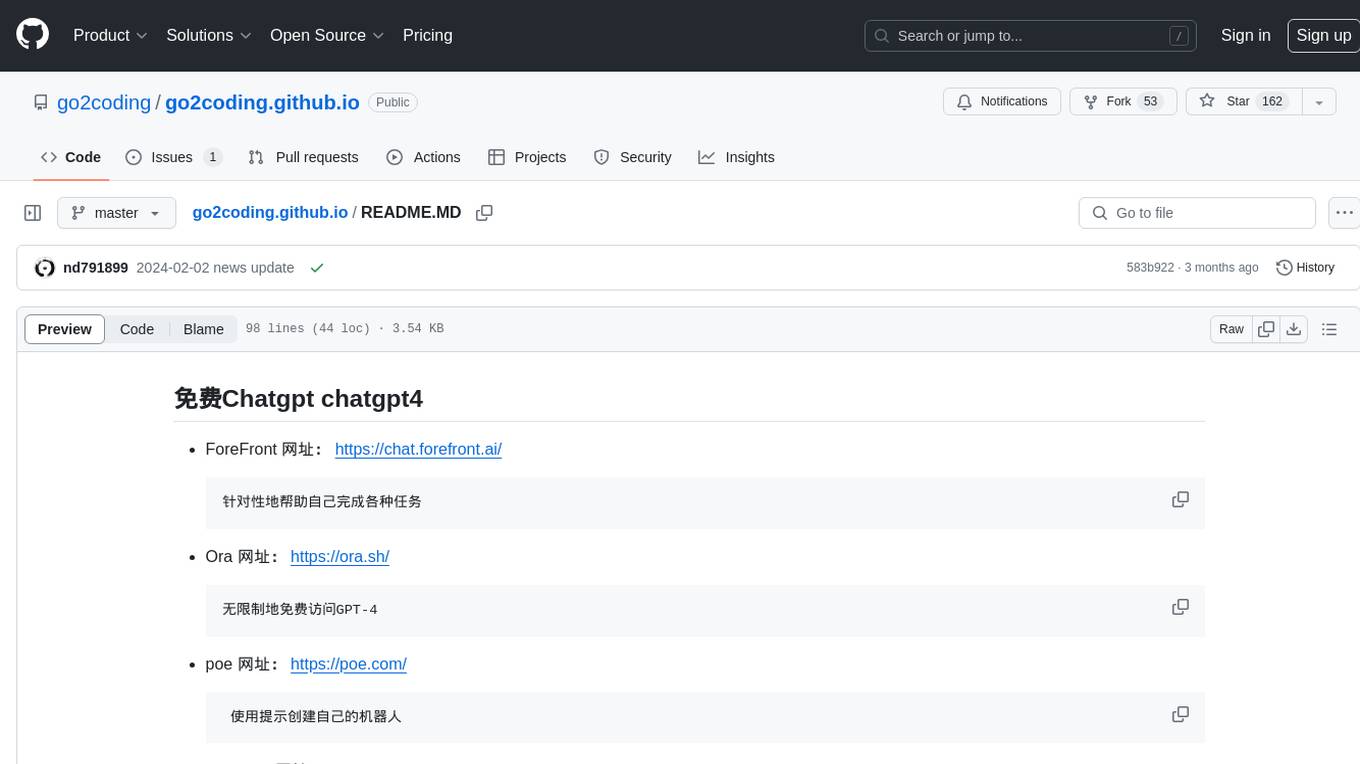
go2coding.github.io
The go2coding.github.io repository is a collection of resources for AI enthusiasts, providing information on AI products, open-source projects, AI learning websites, and AI learning frameworks. It aims to help users stay updated on industry trends, learn from community projects, access learning resources, and understand and choose AI frameworks. The repository also includes instructions for local and external deployment of the project as a static website, with details on domain registration, hosting services, uploading static web pages, configuring domain resolution, and a visual guide to the AI tool navigation website. Additionally, it offers a platform for AI knowledge exchange through a QQ group and promotes AI tools through a WeChat public account.
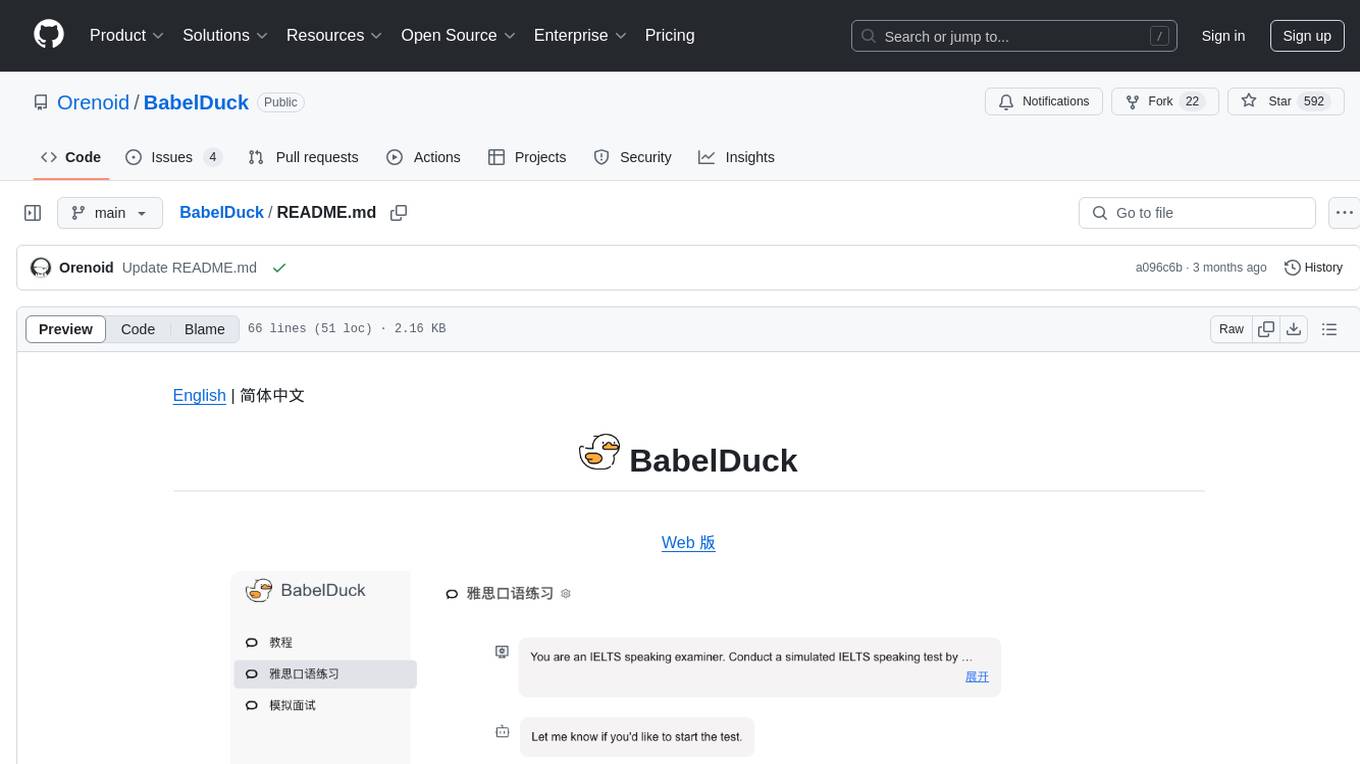
BabelDuck
BabelDuck is a highly customizable AI oral conversation practice application for language learners at all levels, with a focus on being more beginner-friendly. It aims to minimize the threshold and mental burden of oral expression practice. The tool supports various AI conversation features such as managing multiple dialogues, customizing system prompts, and providing suggestions for grammar, translation, or expression refinement without interrupting the current conversation. Users can seek further discussion through sub-dialogues when in doubt about AI suggestions, seamlessly returning to the original conversation afterward. BabelDuck also offers voice input and output, integrates browser-built text-to-speech, and Azure TTS, and supports different dialogue preferences, data stored locally for user privacy, multilingual interface, and built-in tutorials.
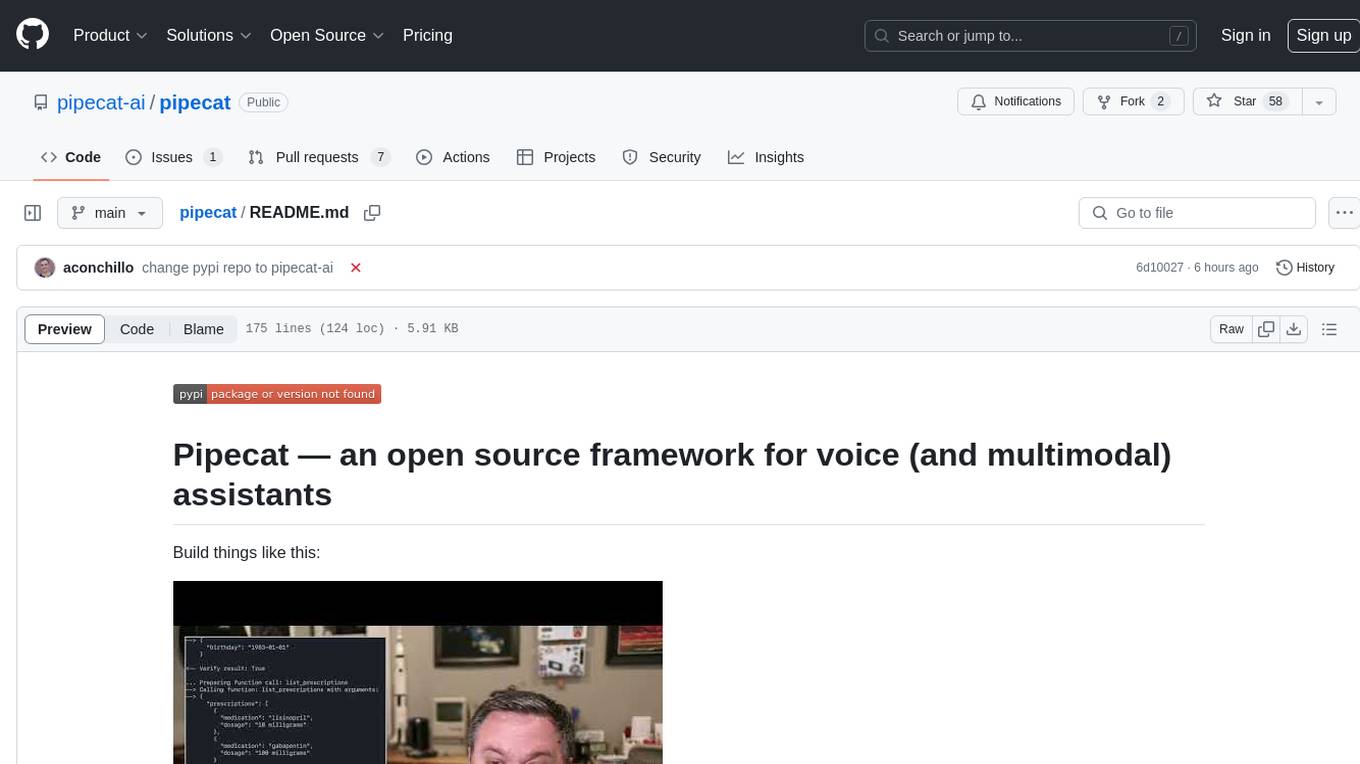
pipecat
Pipecat is an open-source framework designed for building generative AI voice bots and multimodal assistants. It provides code building blocks for interacting with AI services, creating low-latency data pipelines, and transporting audio, video, and events over the Internet. Pipecat supports various AI services like speech-to-text, text-to-speech, image generation, and vision models. Users can implement new services and contribute to the framework. Pipecat aims to simplify the development of applications like personal coaches, meeting assistants, customer support bots, and more by providing a complete framework for integrating AI services.
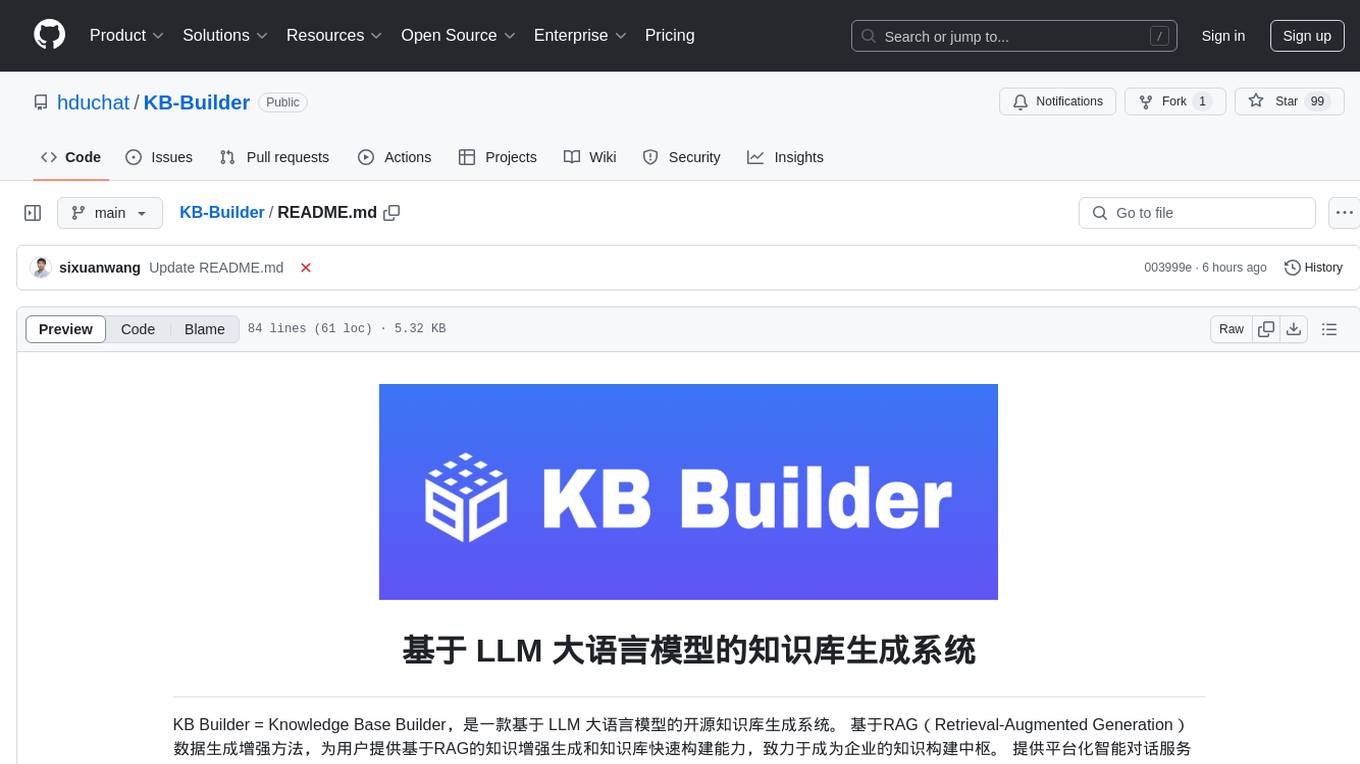
KB-Builder
KB Builder is an open-source knowledge base generation system based on the LLM large language model. It utilizes the RAG (Retrieval-Augmented Generation) data generation enhancement method to provide users with the ability to enhance knowledge generation and quickly build knowledge bases based on RAG. It aims to be the central hub for knowledge construction in enterprises, offering platform-based intelligent dialogue services and document knowledge base management functionality. Users can upload docx, pdf, txt, and md format documents and generate high-quality knowledge base question-answer pairs by invoking large models through the 'Parse Document' feature.
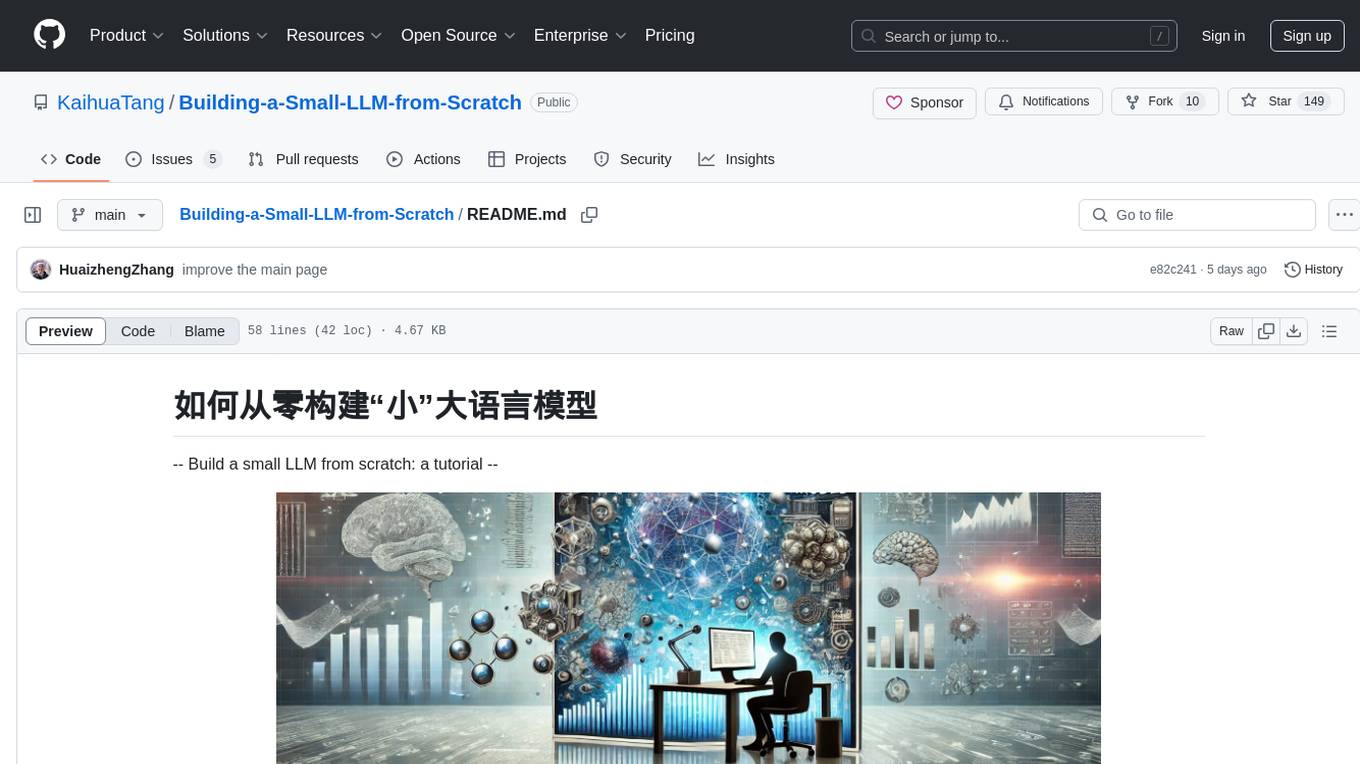
Building-a-Small-LLM-from-Scratch
This tutorial provides a comprehensive guide on building a small Large Language Model (LLM) from scratch using PyTorch. The author shares insights and experiences gained from working on LLM projects in the industry, aiming to help beginners understand the fundamental components of LLMs and training fine-tuning codes. The tutorial covers topics such as model structure overview, attention modules, optimization techniques, normalization layers, tokenizers, pretraining, and fine-tuning with dialogue data. It also addresses specific industry-related challenges and explores cutting-edge model concepts like DeepSeek network structure, causal attention, dynamic-to-static tensor conversion for ONNX inference, and performance optimizations for NPU chips. The series emphasizes hands-on practice with small models to enable local execution and plans to expand into multimodal language models and tensor parallel multi-card deployment.
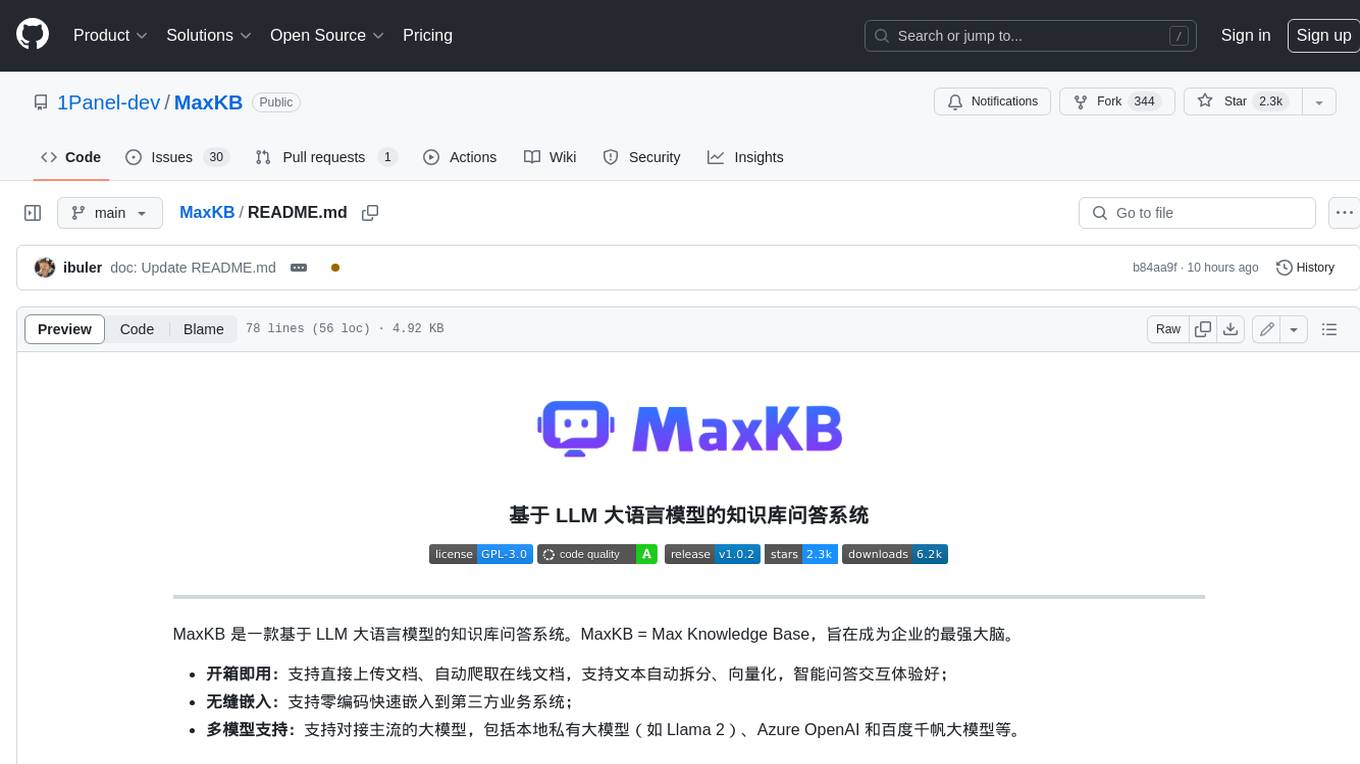
MaxKB
MaxKB is a knowledge base Q&A system based on the LLM large language model. MaxKB = Max Knowledge Base, which aims to become the most powerful brain of the enterprise.
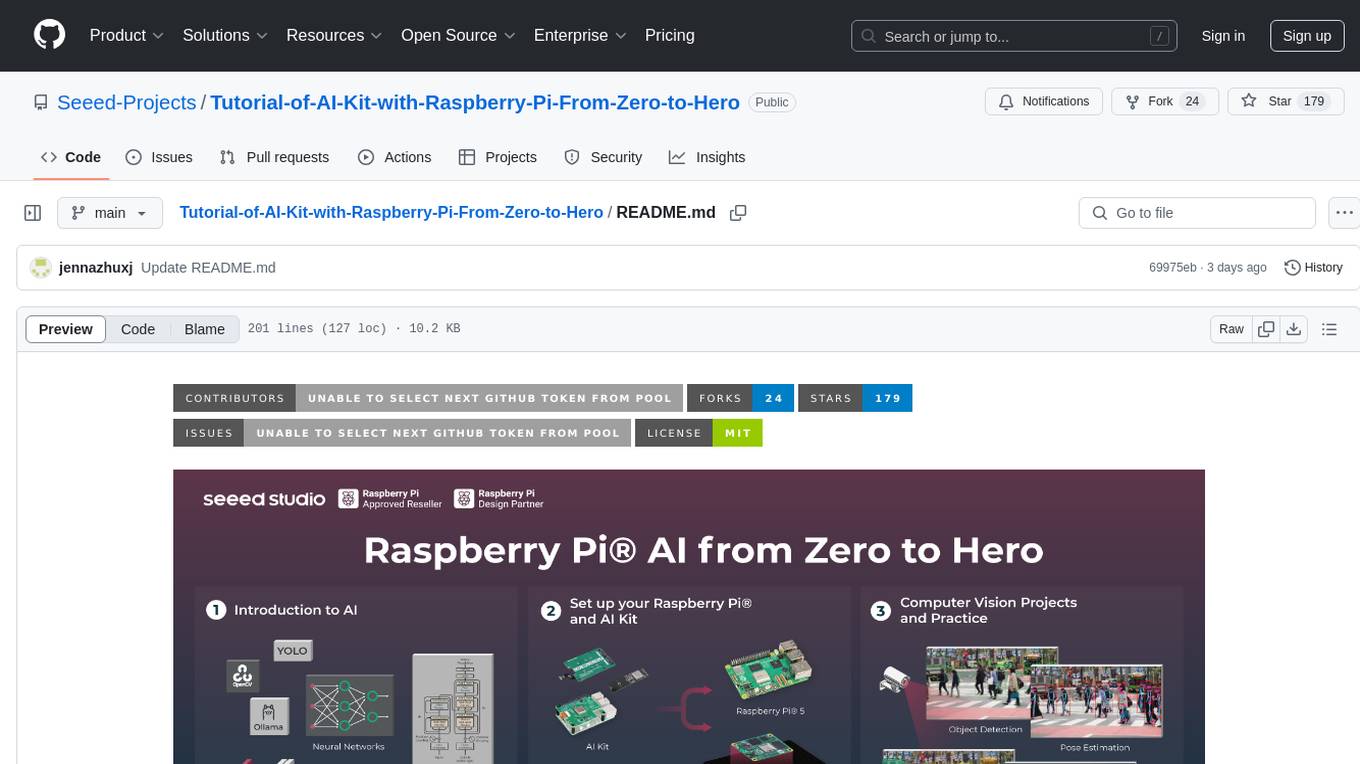
Tutorial-of-AI-Kit-with-Raspberry-Pi-From-Zero-to-Hero
This course is designed to teach you how to harness the power of AI on the Raspberry Pi, with a focus on using an AI kit for computer vision tasks. Learn to integrate AI into IoT applications, from object detection to visual recognition. Suitable for hobbyists, students, and professionals to bring AI-driven solutions to life on resource-constrained devices like the Raspberry Pi.
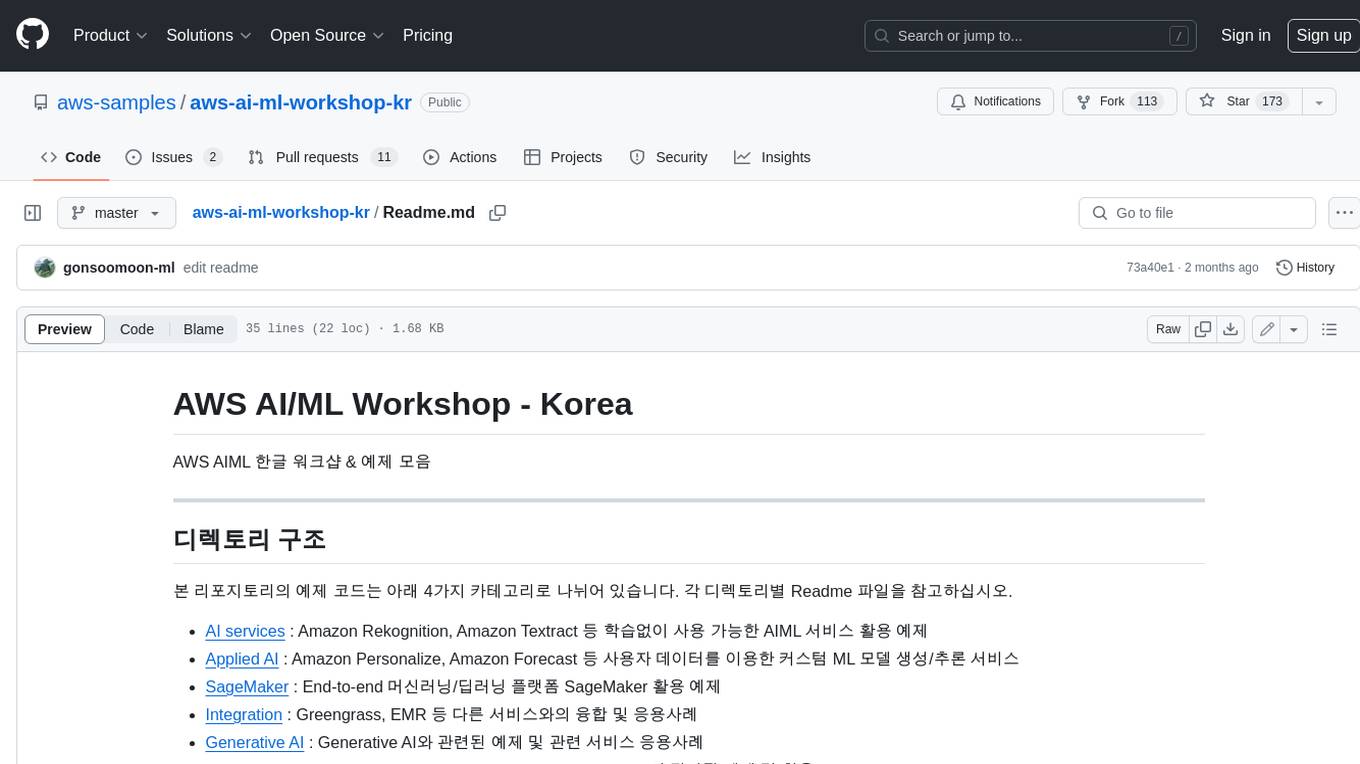
aws-ai-ml-workshop-kr
AWS AI/ML Workshop & example collection in Korean. The example codes in this repository are divided into 4 categories: AI services, Applied AI, SageMaker, Integration, Generative AI, and AWS Neuron. Each directory has its own Readme file. This repository also provides useful information for self-studying SageMaker.
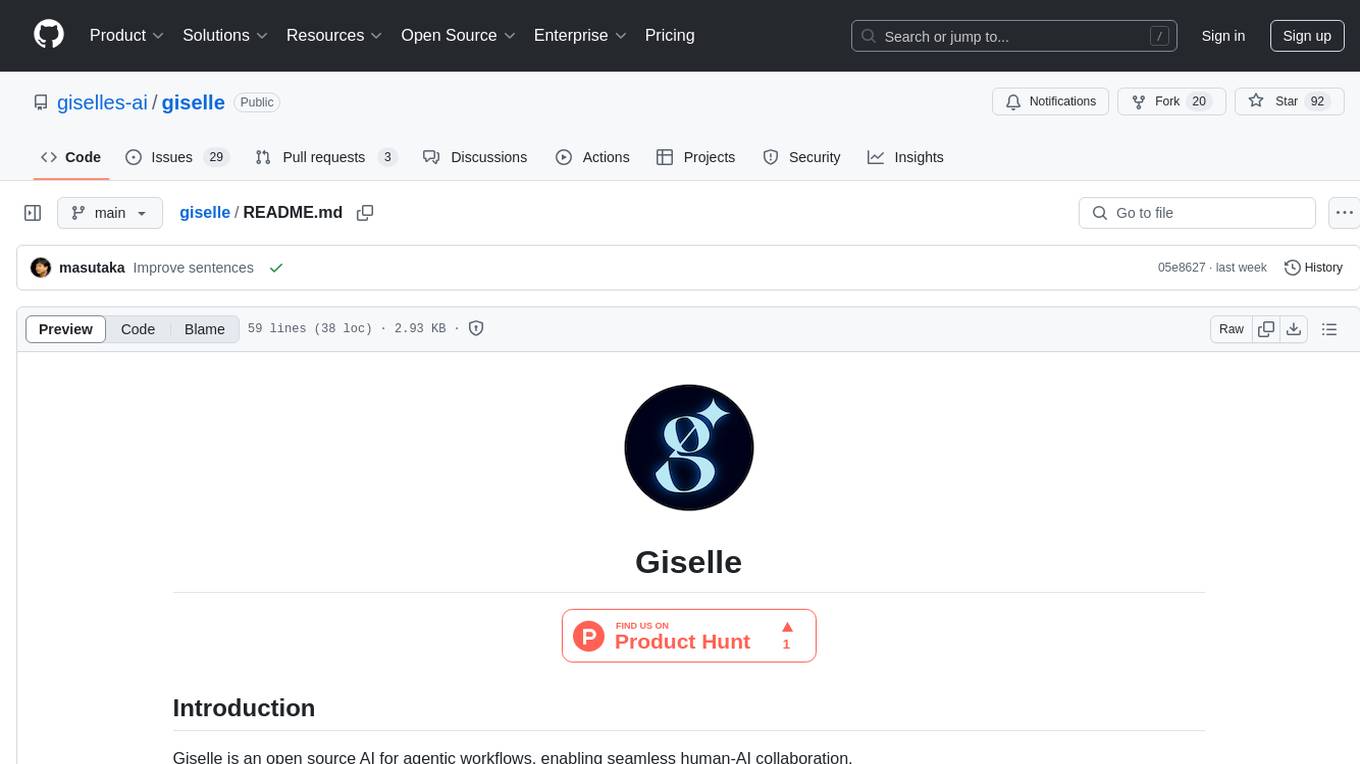
giselle
Giselle is an open source AI tool designed for agentic workflows, facilitating seamless collaboration between humans and AI. It offers cloud hosting with free agent time, self-hosting options, and a Vibe Cording Guide for using AI coding assistants. Giselle is suitable for developers and non-engineers alike, empowering users to leverage AI capabilities without extensive coding knowledge. The tool is actively developed, with a roadmap in progress, and welcomes contributions from the community under the Apache License Version 2.0.
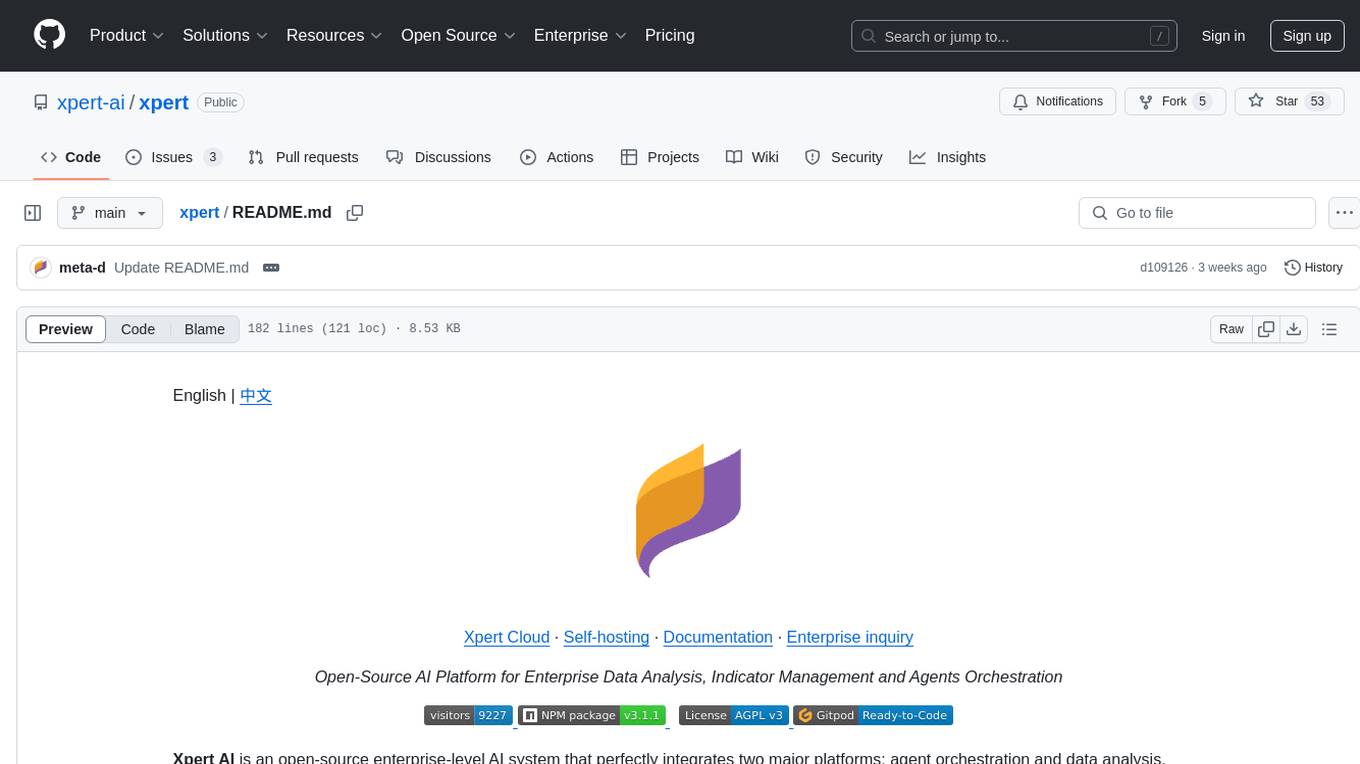
xpert
Xpert is a powerful tool for data analysis and visualization. It provides a user-friendly interface to explore and manipulate datasets, perform statistical analysis, and create insightful visualizations. With Xpert, users can easily import data from various sources, clean and preprocess data, analyze trends and patterns, and generate interactive charts and graphs. Whether you are a data scientist, analyst, researcher, or student, Xpert simplifies the process of data analysis and visualization, making it accessible to users with varying levels of expertise.
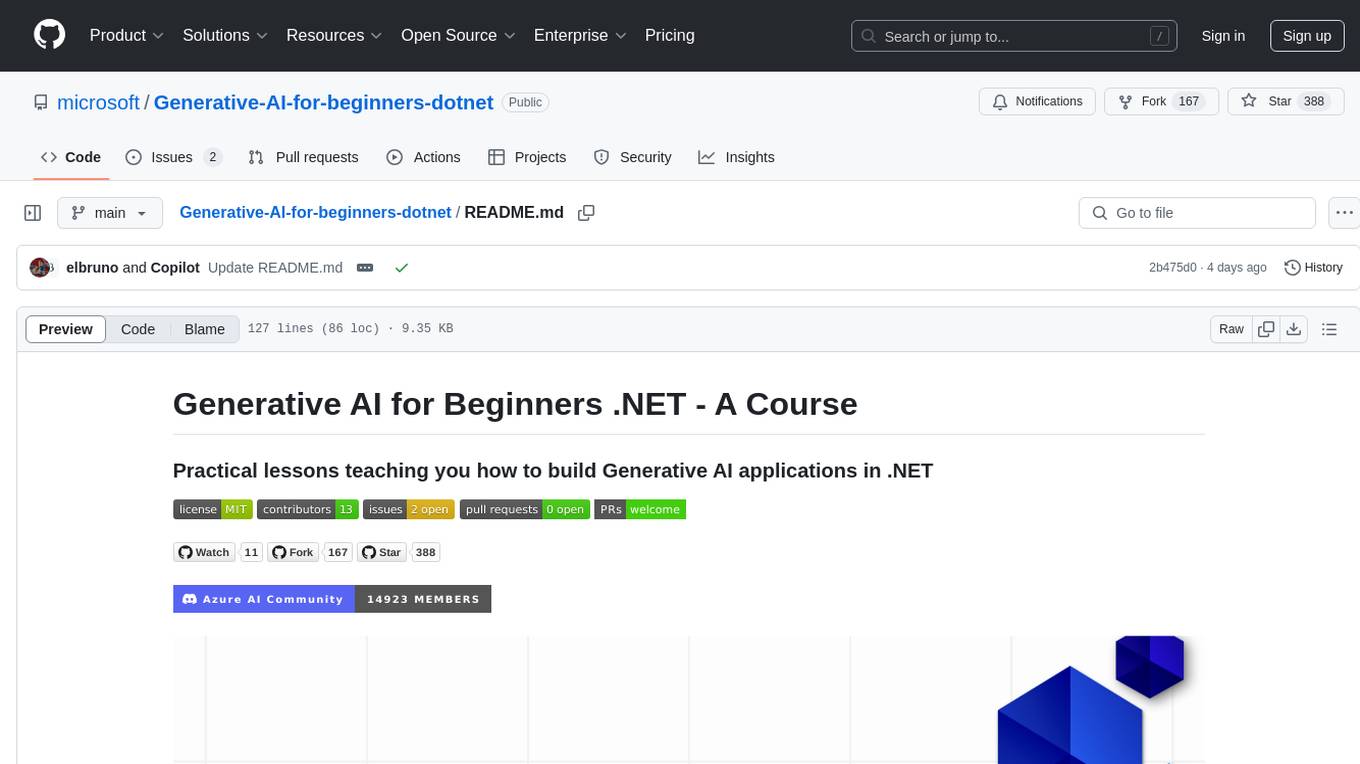
Generative-AI-for-beginners-dotnet
Generative AI for Beginners .NET is a hands-on course designed for .NET developers to learn how to build Generative AI applications. The repository focuses on real-world applications and live coding, providing fully functional code samples and integration with tools like GitHub Codespaces and GitHub Models. Lessons cover topics such as generative models, text generation, multimodal capabilities, and responsible use of Generative AI in .NET apps. The course aims to simplify the journey of implementing Generative AI into .NET projects, offering practical guidance and references for deeper theoretical understanding.
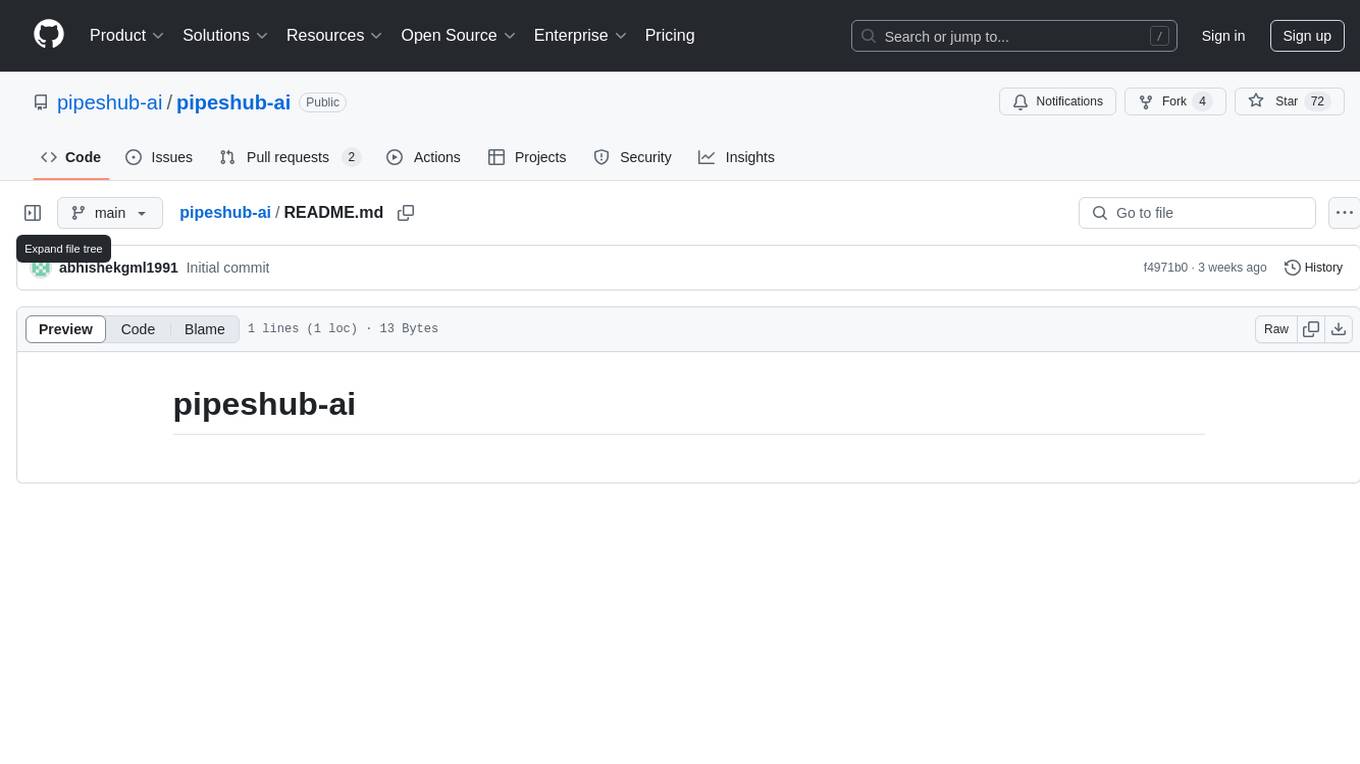
pipeshub-ai
Pipeshub-ai is a versatile tool for automating data pipelines in AI projects. It provides a user-friendly interface to design, deploy, and monitor complex data workflows, enabling seamless integration of various AI models and data sources. With Pipeshub-ai, users can easily create end-to-end pipelines for tasks such as data preprocessing, model training, and inference, streamlining the AI development process and improving productivity. The tool supports integration with popular AI frameworks and cloud services, making it suitable for both beginners and experienced AI practitioners.
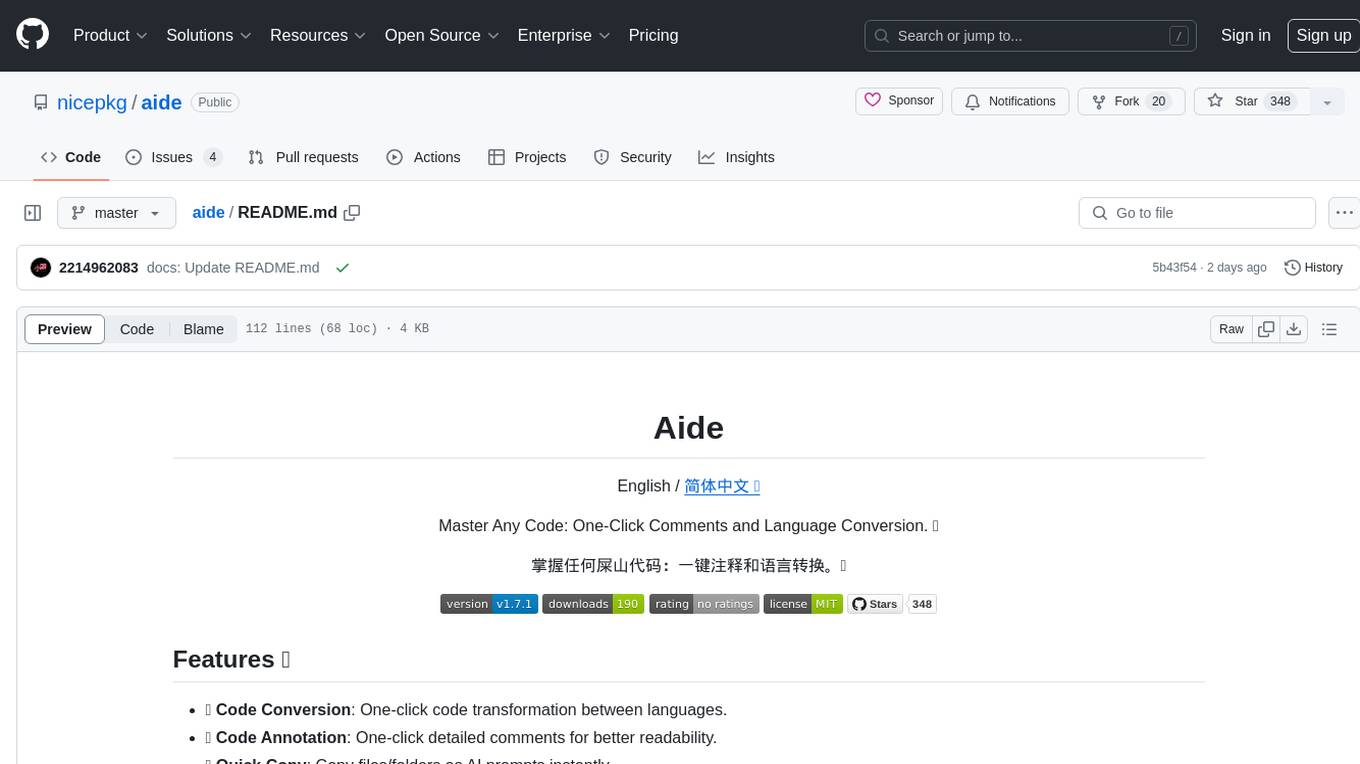
aide
Aide is a Visual Studio Code extension that offers AI-powered features to help users master any code. It provides functionalities such as code conversion between languages, code annotation for readability, quick copying of files/folders as AI prompts, executing custom AI commands, defining prompt templates, multi-file support, setting keyboard shortcuts, and more. Users can enhance their productivity and coding experience by leveraging Aide's intelligent capabilities.
For similar tasks

ai-self-coding-book
The 'ai-self-coding-book' repository is a guidebook that aims to teach how to create complex applications with commercial value using natural language and AI, rather than simple toy projects. It provides insights on AI programming concepts and practical applications, emphasizing real-world use cases and best practices for development.
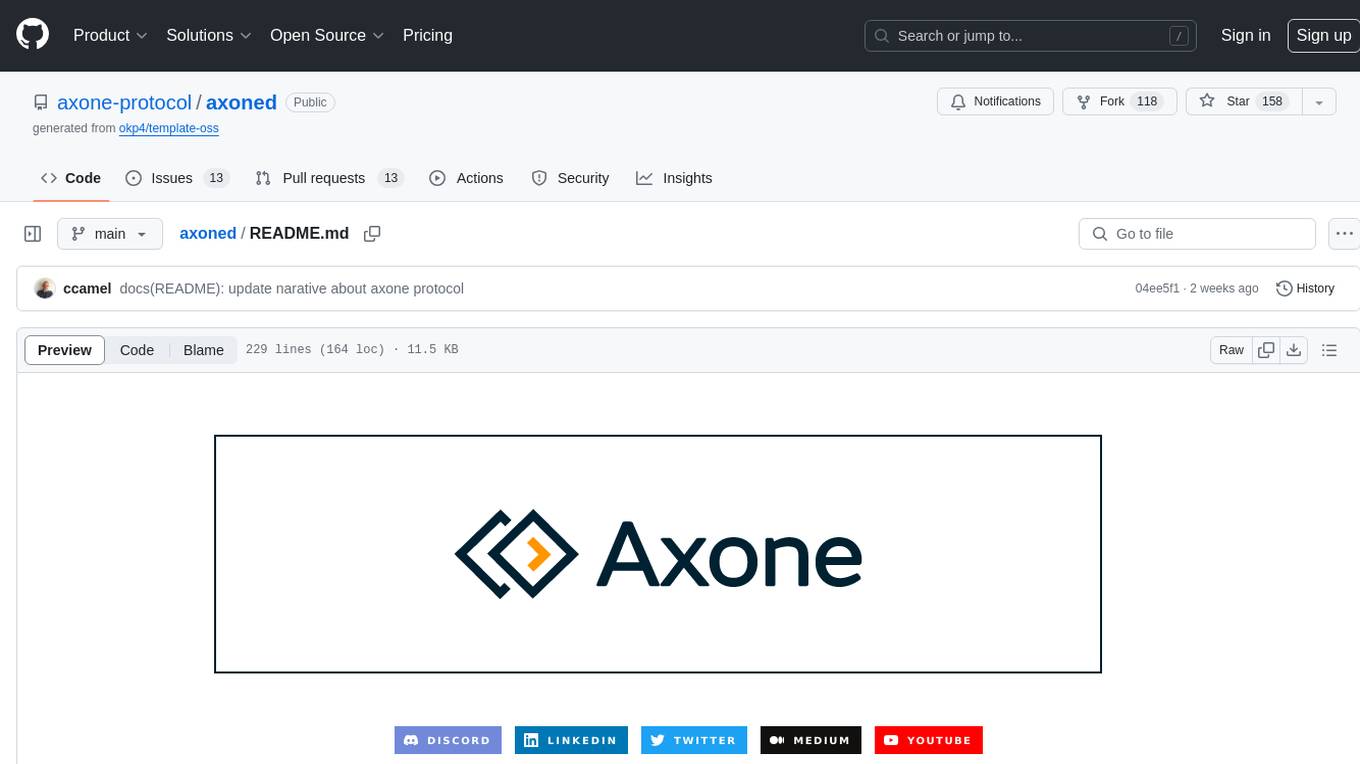
axoned
Axone is a public dPoS layer 1 designed for connecting, sharing, and monetizing resources in the AI stack. It is an open network for collaborative AI workflow management compatible with any data, model, or infrastructure, allowing sharing of data, algorithms, storage, compute, APIs, both on-chain and off-chain. The 'axoned' node of the AXONE network is built on Cosmos SDK & Tendermint consensus, enabling companies & individuals to define on-chain rules, share off-chain resources, and create new applications. Validators secure the network by maintaining uptime and staking $AXONE for rewards. The blockchain supports various platforms and follows Semantic Versioning 2.0.0. A docker image is available for quick start, with documentation on querying networks, creating wallets, starting nodes, and joining networks. Development involves Go and Cosmos SDK, with smart contracts deployed on the AXONE blockchain. The project provides a Makefile for building, installing, linting, and testing. Community involvement is encouraged through Discord, open issues, and pull requests.
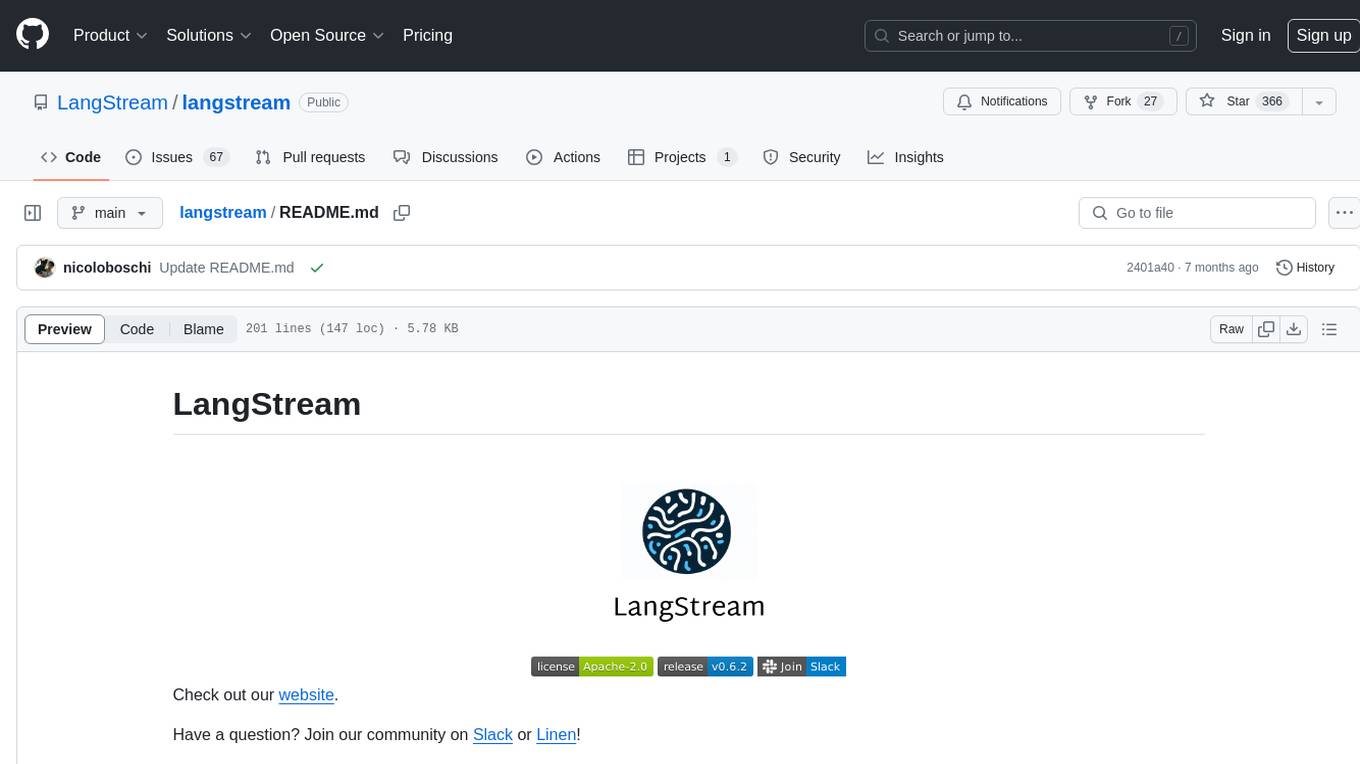
langstream
LangStream is a tool for natural language processing tasks, providing a CLI for easy installation and usage. Users can try sample applications like Chat Completions and create their own applications using the developer documentation. It supports running on Kubernetes for production-ready deployment, with support for various Kubernetes distributions and external components like Apache Kafka or Apache Pulsar cluster. Users can deploy LangStream locally using minikube and manage the cluster with mini-langstream. Development requirements include Docker, Java 17, Git, Python 3.11+, and PIP, with the option to test local code changes using mini-langstream.

atomic_agents
Atomic Agents is a modular and extensible framework designed for creating powerful applications. It follows the principles of Atomic Design, emphasizing small and single-purpose components. Leveraging Pydantic for data validation and serialization, the framework offers a set of tools and agents that can be combined to build AI applications. It depends on the Instructor package and supports various APIs like OpenAI, Cohere, Anthropic, and Gemini. Atomic Agents is suitable for developers looking to create AI agents with a focus on modularity and flexibility.
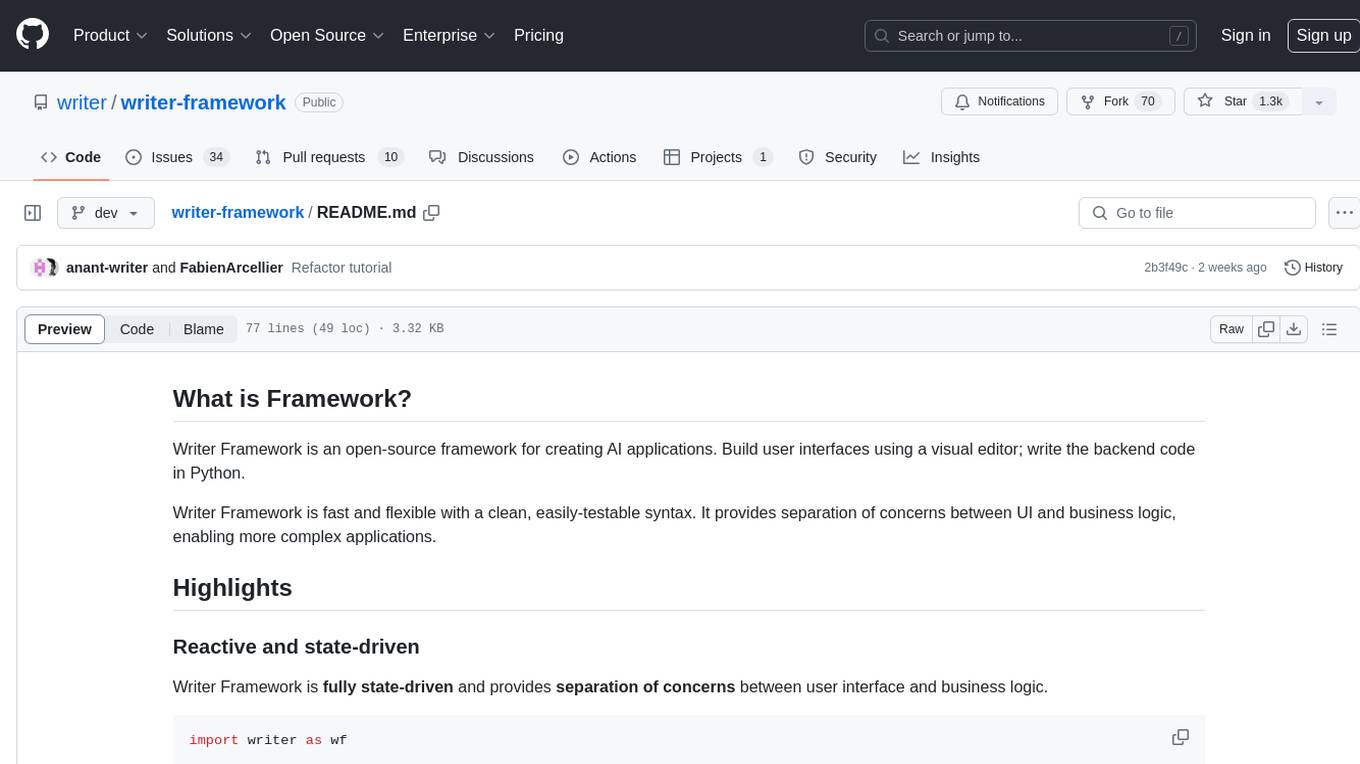
writer-framework
Writer Framework is an open-source framework for creating AI applications. It allows users to build user interfaces using a visual editor and write the backend code in Python. The framework is fast, flexible, and provides separation of concerns between UI and business logic. It is reactive and state-driven, highly customizable without requiring CSS, fast in event handling, developer-friendly with easy installation and quick start options, and contains full documentation for using its AI module and deployment options.
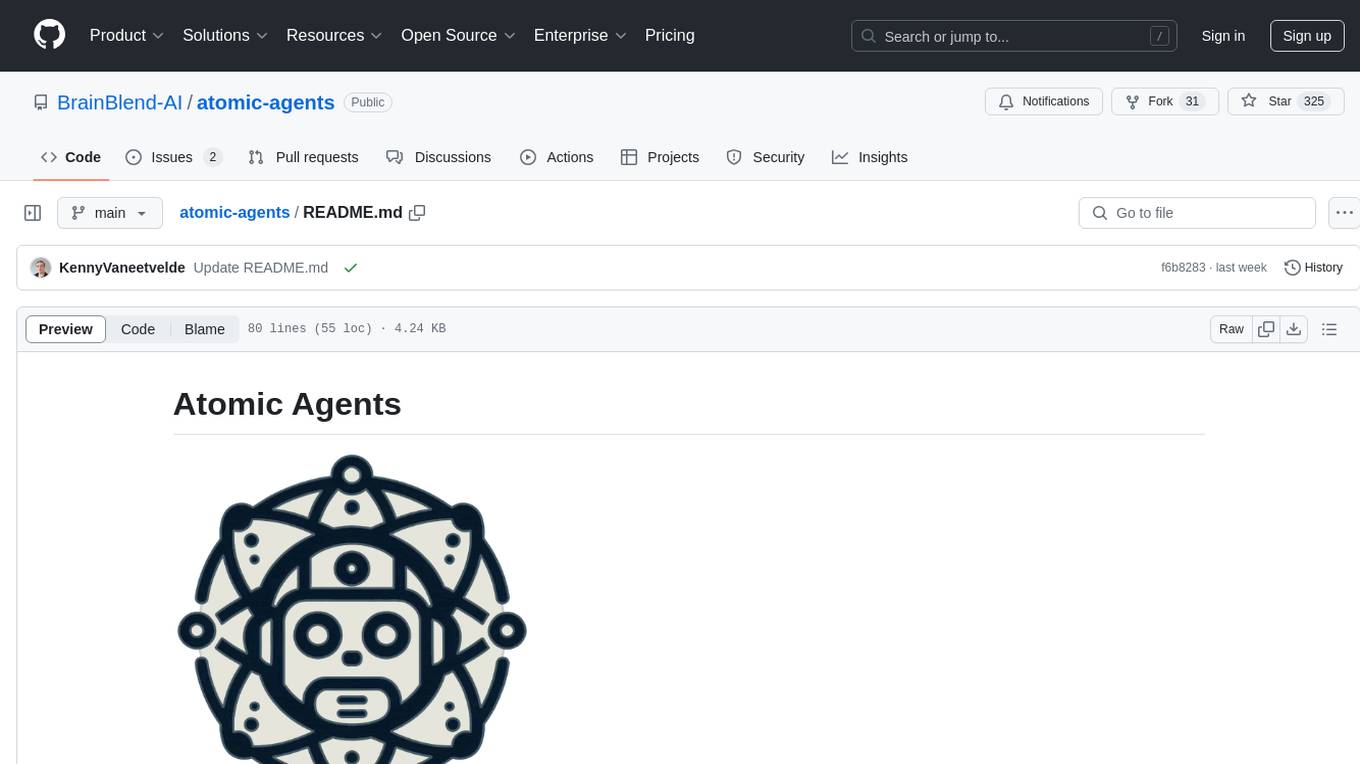
atomic-agents
The Atomic Agents framework is a modular and extensible tool designed for creating powerful applications. It leverages Pydantic for data validation and serialization. The framework follows the principles of Atomic Design, providing small and single-purpose components that can be combined. It integrates with Instructor for AI agent architecture and supports various APIs like Cohere, Anthropic, and Gemini. The tool includes documentation, examples, and testing features to ensure smooth development and usage.
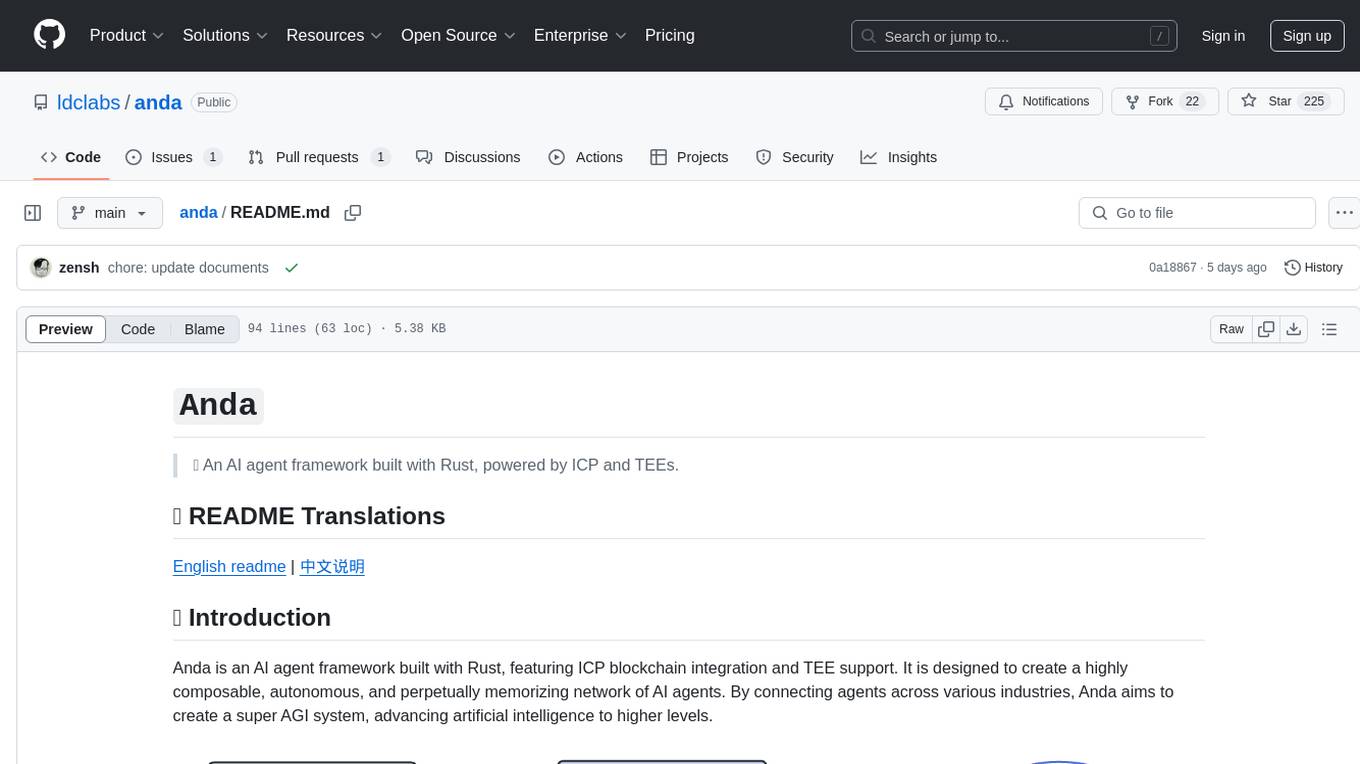
anda
Anda is an AI agent framework built with Rust, integrating ICP blockchain and TEE support. It aims to create a network of highly composable, autonomous AI agents across industries to advance artificial intelligence. Key features include composability, simplicity, trustworthiness, autonomy, and perpetual memory. Anda's vision is to build a collaborative network of agents leading to a super AGI system, revolutionizing AI technology applications and creating value for society.
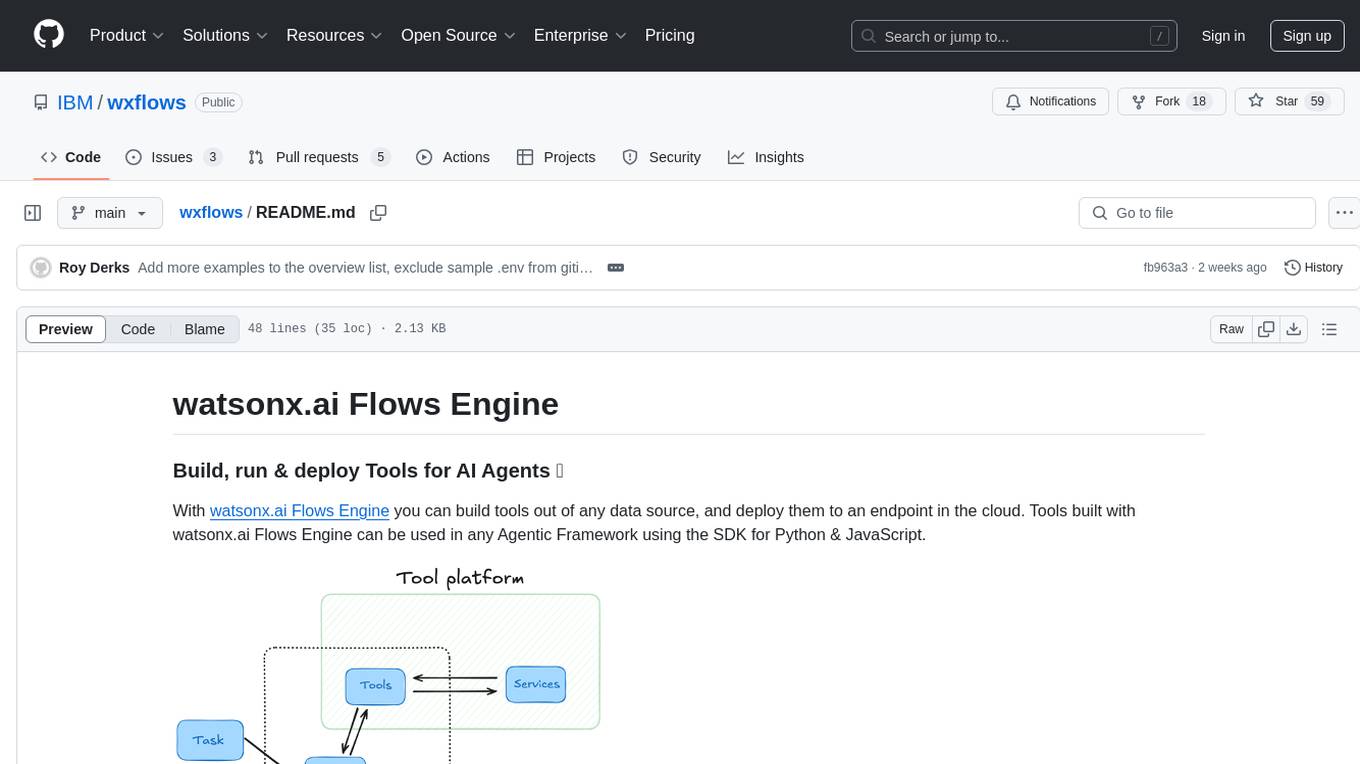
wxflows
watsonx.ai Flows Engine is a powerful tool for building, running, and deploying AI agents. It allows users to create tools from various data sources and deploy them to the cloud. The tools built with watsonx.ai Flows Engine can be integrated into any Agentic Framework using the SDK for Python & JavaScript. The platform offers a range of tools and integrations, including exchange, wikipedia, google_books, math, and weather. Users can also build their own tools and leverage integrations like LangGraph, LangChain, watsonx.ai, and OpenAI. Examples of applications built with watsonx.ai Flows Engine include an end-to-end Agent Chat App, Text-to-SQL Agent, YouTube transcription agent, Math agent, and more. The platform provides comprehensive support through Discord for any questions or feedback.
For similar jobs

promptflow
**Prompt flow** is a suite of development tools designed to streamline the end-to-end development cycle of LLM-based AI applications, from ideation, prototyping, testing, evaluation to production deployment and monitoring. It makes prompt engineering much easier and enables you to build LLM apps with production quality.

deepeval
DeepEval is a simple-to-use, open-source LLM evaluation framework specialized for unit testing LLM outputs. It incorporates various metrics such as G-Eval, hallucination, answer relevancy, RAGAS, etc., and runs locally on your machine for evaluation. It provides a wide range of ready-to-use evaluation metrics, allows for creating custom metrics, integrates with any CI/CD environment, and enables benchmarking LLMs on popular benchmarks. DeepEval is designed for evaluating RAG and fine-tuning applications, helping users optimize hyperparameters, prevent prompt drifting, and transition from OpenAI to hosting their own Llama2 with confidence.

MegaDetector
MegaDetector is an AI model that identifies animals, people, and vehicles in camera trap images (which also makes it useful for eliminating blank images). This model is trained on several million images from a variety of ecosystems. MegaDetector is just one of many tools that aims to make conservation biologists more efficient with AI. If you want to learn about other ways to use AI to accelerate camera trap workflows, check out our of the field, affectionately titled "Everything I know about machine learning and camera traps".

leapfrogai
LeapfrogAI is a self-hosted AI platform designed to be deployed in air-gapped resource-constrained environments. It brings sophisticated AI solutions to these environments by hosting all the necessary components of an AI stack, including vector databases, model backends, API, and UI. LeapfrogAI's API closely matches that of OpenAI, allowing tools built for OpenAI/ChatGPT to function seamlessly with a LeapfrogAI backend. It provides several backends for various use cases, including llama-cpp-python, whisper, text-embeddings, and vllm. LeapfrogAI leverages Chainguard's apko to harden base python images, ensuring the latest supported Python versions are used by the other components of the stack. The LeapfrogAI SDK provides a standard set of protobuffs and python utilities for implementing backends and gRPC. LeapfrogAI offers UI options for common use-cases like chat, summarization, and transcription. It can be deployed and run locally via UDS and Kubernetes, built out using Zarf packages. LeapfrogAI is supported by a community of users and contributors, including Defense Unicorns, Beast Code, Chainguard, Exovera, Hypergiant, Pulze, SOSi, United States Navy, United States Air Force, and United States Space Force.

llava-docker
This Docker image for LLaVA (Large Language and Vision Assistant) provides a convenient way to run LLaVA locally or on RunPod. LLaVA is a powerful AI tool that combines natural language processing and computer vision capabilities. With this Docker image, you can easily access LLaVA's functionalities for various tasks, including image captioning, visual question answering, text summarization, and more. The image comes pre-installed with LLaVA v1.2.0, Torch 2.1.2, xformers 0.0.23.post1, and other necessary dependencies. You can customize the model used by setting the MODEL environment variable. The image also includes a Jupyter Lab environment for interactive development and exploration. Overall, this Docker image offers a comprehensive and user-friendly platform for leveraging LLaVA's capabilities.

carrot
The 'carrot' repository on GitHub provides a list of free and user-friendly ChatGPT mirror sites for easy access. The repository includes sponsored sites offering various GPT models and services. Users can find and share sites, report errors, and access stable and recommended sites for ChatGPT usage. The repository also includes a detailed list of ChatGPT sites, their features, and accessibility options, making it a valuable resource for ChatGPT users seeking free and unlimited GPT services.

TrustLLM
TrustLLM is a comprehensive study of trustworthiness in LLMs, including principles for different dimensions of trustworthiness, established benchmark, evaluation, and analysis of trustworthiness for mainstream LLMs, and discussion of open challenges and future directions. Specifically, we first propose a set of principles for trustworthy LLMs that span eight different dimensions. Based on these principles, we further establish a benchmark across six dimensions including truthfulness, safety, fairness, robustness, privacy, and machine ethics. We then present a study evaluating 16 mainstream LLMs in TrustLLM, consisting of over 30 datasets. The document explains how to use the trustllm python package to help you assess the performance of your LLM in trustworthiness more quickly. For more details about TrustLLM, please refer to project website.

AI-YinMei
AI-YinMei is an AI virtual anchor Vtuber development tool (N card version). It supports fastgpt knowledge base chat dialogue, a complete set of solutions for LLM large language models: [fastgpt] + [one-api] + [Xinference], supports docking bilibili live broadcast barrage reply and entering live broadcast welcome speech, supports Microsoft edge-tts speech synthesis, supports Bert-VITS2 speech synthesis, supports GPT-SoVITS speech synthesis, supports expression control Vtuber Studio, supports painting stable-diffusion-webui output OBS live broadcast room, supports painting picture pornography public-NSFW-y-distinguish, supports search and image search service duckduckgo (requires magic Internet access), supports image search service Baidu image search (no magic Internet access), supports AI reply chat box [html plug-in], supports AI singing Auto-Convert-Music, supports playlist [html plug-in], supports dancing function, supports expression video playback, supports head touching action, supports gift smashing action, supports singing automatic start dancing function, chat and singing automatic cycle swing action, supports multi scene switching, background music switching, day and night automatic switching scene, supports open singing and painting, let AI automatically judge the content.
